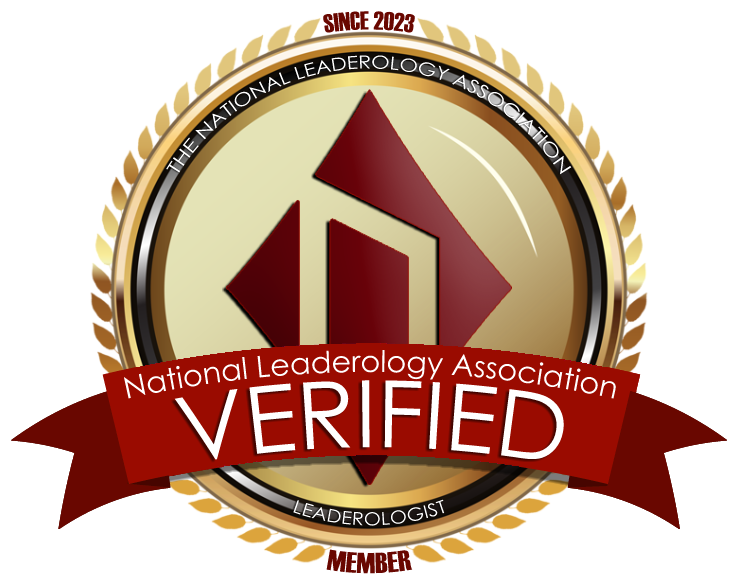A Message of 'Vision' From Our Founder
The science of leadership has captivated me for the bulk of my adult life. The complexities of leadership, the nuances of human behavior, and the strategies behind effective leadership development are all elements that have always sparked my interest. This is to say that I am passionate about the discipline of leadership and leadership development, constantly striving to explore and expand our understanding and application of these critical areas.
Indeed, at the heart of leadership is the responsibility to cultivate and develop more leaders. A deeper understanding of how bias and belief shape leadership development can significantly enhance the consistency and effectiveness of our practices. However, the science behind these crucial factors is extensive and merits thorough exploration. Equally important is raising public awareness about what truly distinguishes a genuine leader from someone merely holding a leadership position, and it’s critical to highlight the difference between those who have formally studied leadership and those who have not, as this distinction is vital to both the integrity and advancement of our field and the protection of those seeking such development.The Evolution of Leadership
Leadership is not static; it evolves as we gain new insights into human motivation and strategy. As technology and industry progress, so too must our understanding of leadership. However, I also see a looming danger in the current state of the discipline. In recent years, leadership has become a buzzword, often exploited by those looking to capitalize on the lucrative coaching industry without a solid foundation in leadership theory or practice. Not only is this dangerous for the public, but this misrepresentation threatens to distort public perceptions of leadership and undermine the progress we’ve made as a discipline.
It’s concerning to witness the science being diluted by unqualified voices. This is a necessary warning: the consequences of misguided advice and poor direction are not only detrimental but also far-reaching. Leadership is not driven by emotions, nor is it a quick fix or a one-size-fits-all solution that is covered in a weekend seminar; it demands deep understanding, ongoing learning, and ethical practice. While the advice offered by uninformed coaches may be well-intentioned, it is often misguided and, ultimately, harmful to individuals, organizations, and entire communities. Something has to change, and the NLA seeks to be that change.A Call to Protect and Advance Our Discipline
The National Leaderology Association (NLA) was established in March 2023 with a clear vision: to establish and promote Leaderology as a respected discipline and science. Our mission is to support and produce exceptional, educated leaders and to become a trusted authority in leadership. We value formal education in leadership theory and practice and honor those who contribute to the ongoing exploration and development of leadership as a science.
Our goals are ambitious but necessary:
- To establish the NLA as an authority in the field of leadership.
- To build a strong community among leadership-educated professionals.
- To become a go-to storehouse of leadership research and development information.
- To help guide and set leadership education standards that protect the public by differentiating leadership-educated professionals.
- To raise awareness about the benefits and importance of our discipline and to help businesses better utilize those with leadership degrees.
Our objectives align with these goals, focusing on the verification of high-quality leaderologists, continued education, promotion of leadership standards, innovation, and advocacy for the leadership industry. We are committed to partnering with universities and other institutions to further enhance and elevate the discipline in meaningful ways.
A Commitment to the Future
As the founder, I hope to see the leadership industry continue to take steps to protect itself and the public from those who would undermine its credibility. While the NLA may not solve all the world’s problems, I see the NLA as a small light in the darkness, contributing to a collective effort that, when our members work together, can shine brightly. The more of us there are who are committed to these principles, the more we can achieve and the more people we can protect.
Leadership (leaderology) is a discipline with deep roots, stretching back to the teachings of Aristotle and beyond. Today, it stands as one of the most studied topics in social science, with active research spanning organizational development to neuroscience. The NLA exists to honor that rich history while driving the discipline forward into a future where leaderology is recognized and respected for the social science that it is. However, this requires that we distinguish it from the non-scientific elements currently plaguing the discipline.
In creating this association, my goal has always been to ensure that leadership is practiced and taught with integrity, rigor, and respect for its true complexities. As we move forward, I urge all members to stay true to our core principles. Similarly, I urge members to see the NLA as your team and to work together to protect and advance the discipline we all care so deeply about, and to protect the public from those who would want to take advantage of them.
Thank you. It has been nothing short of an honor to serve this organization. I hope for nothing but continued success and progress toward the achievement of these methodically set and attainable goals. Continue the fight, and never lose sight of the vision!
Dr. David M Robertson, MLS, VL2

